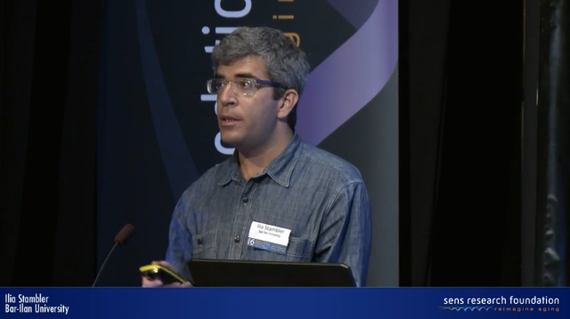***Ilia Stambler, PhD, is a researcher at Bar Ilan University, Israel. His research focuses on the historical and social implications of aging and life extension research. He is the author of A History of Life-extensionism in the Twentieth Century (www.longevityhistory.com). He is actively involved in advocacy for aging and longevity research (www.longevityforall.org). He is chair of the Israeli Longevity Alliance (www.longevityisrael.org/)
Will the cure for cancer ever be found? Will robots be able to replace doctors? Will human being reach immortality? Our interviewee, Dr. Ilia Stambler, answers these and other questions about the future of health and the battle against diseases.
The researcher from The Bar-Llan University in Israel is one of the world's most prestigious experts in the field of longevity studies, who has first-hand updated information within the international scientific circle, who fight against diseases, implementing the most innovative technologies with the aim of raising the quality and the life expectancy of the human being.
10 years ago you wrote about cancer (1)...¿ cancer will be overcome?
I do hope so. Likely it will not be "completely cured" as cancer is an adverse outcome of the cell's replicative potential that is essential for life. But it may be possible to prevent it for a long time, and if it does arrive, to make it manageable. As the risk for cancer greatly increases due to the aging process (as well as the risk for other aging-related diseases, such as Alzheimer's, chronic obstructive lung disease, Type 2 diabetes, heart disease, etc) - an effective way to prevent cancer (and those other diseases) may be by intervening into and postponing the degenerative aging process itself! And it may be possible to do so with sufficient effort. In our work on cancer detection that you referred to, we also show that for cancer diagnosis it is important to consider the combination of diagnostic parameters, including age, not just look at individual factors, in order to improve diagnosis. To overcome or postpone the appearance of cancer, as well as other age-related diseases, it will also be necessary to address many risk factors holistically, as a combination, including the aging process. That is not an easy task, but it can be done with sufficient effort.
How long will life expectancy be in the next few years?
It is difficult to make exact predictions. The trends of life-expectancy are different in different circumstances. Now the world average life expectancy is about 71 years, while it is about 80 in the "developed" countries. However, in the so-called "developed" countries, the increases in life expectancy recently slowed down, though they are still rather large. On the average, in the "developed countries" every year, about 3 months are added to the life expectancy. In contrast, in the so-called "developing" countries, in Latin America, Africa and parts of Asia, life expectancy has been increasing as much as about 6 months every year. That means a dramatic reduction of people's mortality. Yet, further reductions of mortality and improvements of life expectancy can be possible in the near future thanks to development of new medical technologies, even radical improvements.
What are the most common diseases in the future?
Due to the aging of the world population, communicable infectious diseases are becoming less prevalent, while chronic, age-related diseases (cancer, dementia, heart disease, type 2 diabetes, etc.) take the central stage. And that is a sign of the progress of medicine that was able to intervene and virtually eradicate many deadly infectious diseases that did not allow many people to survive to old age. (Though of course even now problems and dangers of infectious diseases still remain and need to be dealt with, such as antibiotic resistance.) But what will happen if it is possible to intervene into the aging process and thereby virtually eradicate also aging-related diseases? What kind of diseases may appear then? I hope we get to the point when we can face this question.
Do you think that human will "link" with machines with artificial intelligence?
We are already linked with artificial intelligence (AI). Few people in the world can now live without internet communication and search engines, which are forms of AI. Nowadays, a question that required days of research in a library, can be answered by a search engine in a moment. There may be good and bad sides to this trend. Many people rely on AI so much that they begin to forget their grammar and arithmetic. But the trend of combining human and artificial intelligence is already here, and will likely intensify in the future. The hope is to make the best of this trend, also for the solution of urgent scientific and medical questions that face humanity.
Do you think that robot would replace doctors in the future?
It is unlikely that robots will completely replace doctors. Whatever the degree of formalization and computerization of medical knowledge and skill, there will also be a place for a human "touch", intuition, experience and "knack" that cannot be easily formalized and reproduced by computers. But I do believe there will be a stronger use of the capabilities of artificial intelligence and big data analytics to find effective and precise diagnostic and therapeutic solutions, robotic surgery and other forms of computer assisted precision therapy, by the physicians as well as by the patients themselves.
What are the main organizations in the world that are doing studies on longevity?
There are various types of organizations for the advancement of longevity studies. One type is the academic research institutes, mainly associated with universities, that study biological aging processes and work to translate this knowledge into therapies for age-related ill health. There are now dozens of such research institutes around the world, though with a notable concentration in the US (e.g. Buck Institute in Novato California, Albert Einstein College of Medicine in New York). Another type is the private for-profit companies engaged in commercial translation and application of longevity research (e.g. Calico, Human Longevity Inc.). And yet another type is the non-profit research and advocacy associations (e.g. the International Society on Aging and Disease). All types of related organizations need to be encouraged and supported for the longevity field to flourish. Currently, the pro-longevity organizations are mainly concentrated in the US. There needs to be a greater spread of such organizations and institutes around the world to advance the field globally.
Do you think human can be immortal?
Potential immortality is a property of life, which allowed life to survive for billions of years. There is also no law in nature that mandates aging or prevents potential immortality also for individual organisms. Many organisms in nature do not age, are able to rejuvenate themselves, or can be considered potentially immortal (in the sense of potential indefinite continuation of some of their properties). Can it be possible for humans? Evidently, there are certain limitations to the human lifespan that result from the human evolutionary development under specific environmental conditions, producing specific internal organization. Can those limitations be completely overcome to produce an immortal organism? And if they can be, how much of a "human" will remain in that organism? These are rather theoretical questions, perhaps relevant for a distant future. What is certain now is that the present human lifespan can be extended to some degree and that human longevity and health can be improved by medical technology. Let us hope that we can make the best use of medical science and technology to achieve healthy life extension for ourselves and others as much as we possibly can.
Is there any longevity project in the world that you want to highlight?
I would rather not promote any particular research project or direction. We do not know yet what research project or direction can be most promising for extending healthy longevity. What I would like to promote is the setting of the goal of extending healthy longevity as a public priority. Thanks to such goal setting and public support, many new and diverse research projects and directions can flourish. To achieve this goal, we need to strengthen the public grass roots movement for healthy longevity, that should include not only scientists, but people from all walks of life. The longevity movement needs to engage activists and public educators, organize outreach and awareness campaigns and develop advocacy organizations - in a way similar to the Green movement or other public movements. Such public involvement and activism for longevity science are only beginning to emerge, but they do begin to emerge. A good example is the recent International Longevity Day (October 1) and Longevity Month (October) campaigns that engaged longevity activists from dozens of countries. Hopefully there will be more public advocacy initiatives, more events, publications and organizations supporting the advancement of science for healthy longevity, and more and more people will join the longevity movement.
(1) http://www.cmpbjournal.com/article/S0169-2607%2806%2900272-0/abstract

